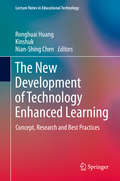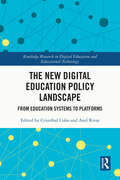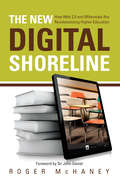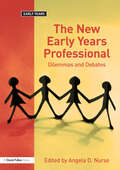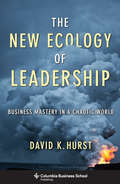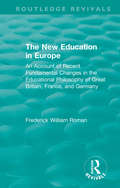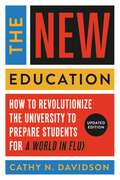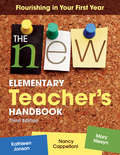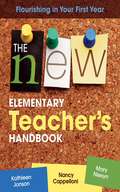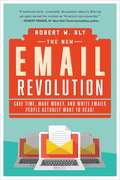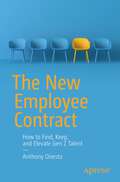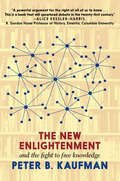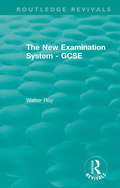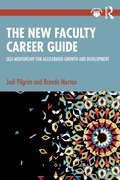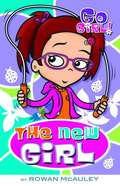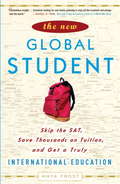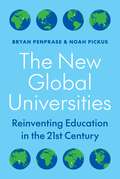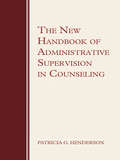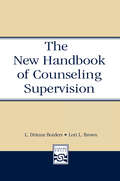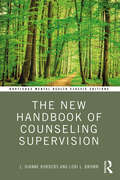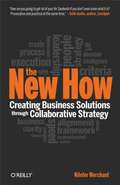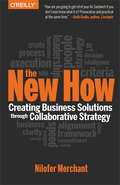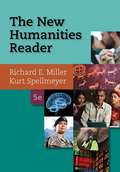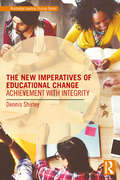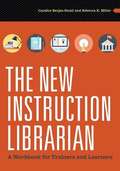- Table View
- List View
The New Development of Technology Enhanced Learning
by Kinshuk Ronghuai Huang Nian-Shing ChenThe book addresses the main issues concerned with the new development of learning processes, innovative pedagogical changes, the effects of new technologies on education, future learning content, which aims to gather the newest concepts, research and best practices on the frontiers of technology enhanced learning from the aspects of learning, pedagogies and technologies in learning in order to draw a picture of technology enhanced learning in the near future. Some issues like "e-learning . . . m-learning . . . u-learning - innovative approaches," "the Framework and Method for Understanding the New Generation Students," "Context-aware Mobile Role Playing Game for Learning," " Pedagogical issues in content creation and use: IT literacy through Spoken Tutorials," "Supporting collaborative knowledge construction and discourse in the classroom," "Digital Systems for Hierarchical Open Access to Education," " Using Annotated Patient Records to Teach Clinical Reasoning to Undergraduate Students of Medicine," " Utilizing Cognitive Skills Ontology for Designing Personalized Learning Environments" and "Using Interactive Mobile Technologies to Develop Operating Room Technologies Competency" are discussed in separate chapters.
The New Digital Education Policy Landscape: From Education Systems to Platforms (Routledge Research in Digital Education and Educational Technology)
by Axel Rivas Cristóbal CoboThis book provides a scholarly investigation of the new era we have entered, in which platforms can replace or profoundly modify educational systems, and questions the role of educational policy in this new stage of platform-based digital technology. The contributors explore important questions around who controls these transformations, what form they are taking, what the balance between national education policies and Big Tech education solutions should be, as well as whether there should be a public platform in every education system that digitally expands learning, and what evidence there is that learning will be more efficient using these platforms. The first part provides a selection of empirical studies on the new digital educational policy, and an analysis of the real opportunities and concerns that governments face in this regard, while the second offers reflections on the processes of platformization and the role of the State in this new digital world. Uniquely examining the temporal evolution of these changes and taking a theoretical, political, and epistemological approach, it crucially opens pathways for dialogical, and diverse critical thinking about profound problems and possibilities. Gathering purposeful thinking that creates space for design solutions and rethinking educational systems considering these new technological artifacts, it will appeal to researchers and specialists in the fields of educational technology and educational policy.
The New Digital Shoreline: How Web 2.0 and Millennials Are Revolutionizing Higher Education
by Roger McHaneyTwo seismic forces beyond our control – the advent of Web 2.0 and the inexorable influx of tech-savvy Millennials on campus – are shaping what Roger McHaney calls “The New Digital Shoreline” of higher education. Failure to chart its contours, and adapt, poses a major threat to higher education as we know it.These forces demand that we as educators reconsider the learning theories, pedagogies, and practices on which we have depended, and modify our interactions with students and peers—all without sacrificing good teaching, or lowering standards, to improve student outcomes. Achieving these goals requires understanding how the indigenous population of this new shoreline is different. These students aren’t necessarily smarter or technologically superior, but they do have different expectations. Their approaches to learning are shaped by social networking and other forms of convenient, computer-enabled and mobile communication devices; by instant access to an over-abundance of information; by technologies that have conferred the ability to personalize and customize their world to a degree never seen before; and by time-shifting and time-slicing.As well as understanding students’ assumptions and expectations, we have no option but to familiarize ourselves with the characteristics and applications of Web 2.0—essentially a new mind set about how to use Internet technologies around the concepts of social computing, social media, content sharing, filtering, and user experience.Roger McHaney not only deftly analyzes how Web 2.0 is shaping the attitudes and motivations of today’s students, but guides us through the topography of existing and emerging digital media, environments, applications, platforms and devices – not least the impact of e-readers and tablets on the future of the textbook – and the potential they have for disrupting teacher-student relationships; and, if appropriately used, for engaging students in their learning.This book argues for nothing less than a reinvention of higher education to meet these new realities. Just adding technology to our teaching practices will not suffice. McHaney calls for a complete rethinking of our practice of teaching to meet the needs of this emerging world and envisioning ourselves as connected, co-learners with our students.
The New Early Years Professional: Dilemmas and Debates
by Angela D. NurseCelebrating the spirit and need for increased multi-disciplinary working and co-operation in the care and education of children, this book addresses the emergence of a new type of early years professional. It will support the reader in understanding the background and context to the current situation of change and excitement as well as help them reflect on the challenges and possibilities of future Early Years and interagency working. It covers key issues such as: families, children and culture health and well-being safeguarding children leadership and management. Adopting an analytical and reflective style appropriate for degree-level study, this book is a core reader for all Early Childhood Studies and Early Years courses.
The New Ecology of Leadership: Business Mastery in a Chaotic World (Columbia Business School Publishing)
by David HurstDavid Hurst has a unique knowledge of organizations—their function and their failure—both in theory and in practice. He has spent twenty-five years as an operating manager, often in crises and turnaround conditions, and is also a widely experienced consultant, teacher, and writer on business. This book is his innovative integration of management practice and theory, using a systems perspective and analogies drawn from nature to illustrate groundbreaking ideas and their practical application. It is designed for readers unfamiliar with sophisticated management concepts and for active practitioners seeking to advance their management and leadership skills. Hurst's objective is to help readers make meaning from their own management experience and education, and to encourage improvement in their practical judgment and wisdom. His approach takes an expansive view of organizations, connecting their development to humankind's evolutionary heritage and cultural history. It locates the origins of organizations in communities of trust and follows their development and maturation. He also crucially tracks the decline of organizations as they age and shows how their strengths become weaknesses in changing circumstances. Hurst's core argument is that the human mind is rational in an ecological, rather than a logical, sense. In other words, it has evolved to extract cues to action from the specific situations in which it finds itself. Therefore contexts matter, and Hurst shows how passion, reason, and power can be used to change and sustain organizations for good and ill. The result is an inspirational synthesis of management theory and practice that will resonate with every reader's experience.
The New Education in Europe: An Account of Recent Fundamental Changes in the Educational Philosophy of Great Britain, France, and Germany (Routledge Revivals)
by Frederick William RomanOriginally published in 1924, as outlined in the preface, this book is "based on the belief that the only substantial hope of rescue in the present world-crisis and the saving of even civilization itself depend upon the degree to which the creative thought that the coming generations may bring is applied to a continued and purposeful reconstruction of the modes of living. The world is in need, as never before, of stronger and more clearly-conceived ideals of conscious effort in the service of humanity. The salvation of society must be mined out of its own depths. Much of this work must be done by those now at school, and therefore we are at once led to inquire to what extent the present systems of education provide for conditions that are provocative of free and spontaneous thought." "In each of the several countries with which the present study is concerned there is a considerable body of men and women who have undertaken a serious and thoughtful campaign of education. The pages that follow attempt to give a summary account of the origin and the likelihood of success of these several undertakings."
The New Education: How to Revolutionize the University to Prepare Students for a World In Flux
by Cathy N. DavidsonA leading educational thinker argues that the American university is stuck in the past--and shows how we can revolutionize it for our era of constant changeOur current system of higher education dates to the period from 1865 to 1925, when the nation's new universities created grades and departments, majors and minors, in an attempt to prepare young people for a world transformed by the telegraph and the Model T. As Cathy N. Davidson argues in The New Education, this approach to education is wholly unsuited to the era of the gig economy. From the Ivy League to community colleges, she introduces us to innovators who are remaking college for our own time by emphasizing student-centered learning that values creativity in the face of change above all. The New Education ultimately shows how we can teach students not only to survive but to thrive amid the challenges to come.
The New Elementary Teacher's Handbook: Flourishing in Your First Year
by Kathleen F. Jonson Nancy L. Cappelloni Mary E. NiesynEverything a new elementary teacher needs for getting started is right here! This comprehensive guide from veteran educators gives first-year teachers expansive classroom-tested strategies for those critical first days of school. Written in the reassuring tone of a mentor teacher, this research-based handbook walks the novice teacher through setting up your classroom, managing behavior, assessing students’ performance, and partnering with families. Thoroughly updated, this new edition includes the latest tips on: Teaching with technology Differentiating instruction for students from diverse backgrounds, including English language learners Planning effective standards-based lessons Achieving professional growth through job-embedded professional development
The New Elementary Teacher's Handbook: Flourishing in Your First Year
by Mary Niesyn Nancy Cappelloni Kathleen JonsonElementary school provides foundational development and education for students, and there is much that a new teacher must consider when taking on the responsibility of shaping young minds. In The New Elementary Teacher's Handbook, veteran educators give first-year teachers a multitude of classroom-tested strategies for those critical first days of school. New teachers need just as much guidance as students in order for everyone to come away with a valuable learning experience. This authoritative handbook gives teachers practical and thorough instruction on: · Organizing the classroom and preparing engaging and effective lesson plans · Teaching using technology and the Internet · Dealing with difficult parents and conducting conferences · Motivating students and increasing positive interactions · Balancing personal and professional matters With resources, samples, templates, homework contracts, strategies, checklists, and proven solutions to everyday challenges, this book shows teachers how to turn their plans into effective strategies in the classroom. Rest assured that you are not alone, and you will succeed!
The New Email Revolution: Save Time, Make Money, and Write Emails People Actually Want to Read!
by Robert W. BlyPractices, strategies, and templates for optimizing your email use. The average business employee spends more than thirteen hours a week reading and responding to email. That’s 675 or more hours—over 28 days a year—spent on email. Wouldn’t it be nice to get some of that time back? In The New Email Revolution, Robert W. Bly Bly draws from decades of experience sending millions of emails to help you take that time back. With this book in hand, you will be able to quickly and easily: •Find templates you can use to create emails for dozens of different situations. •Know the right wording and optimal word length for email communication. •Get recipients to read and respond to your email messages. •Understand when it is legal and not legal to send email to a person you do not know. •Incorporate photos, graphics, sound, and video into your email messages. •Measure the deliverability, bounce rate, open rate, and response rate to every email you send. •Write clearer, more engaging, more persuasive email copy for every occasion. Get better results in less time with The New Email Revolution.
The New Employee Contract: How to Find, Keep, and Elevate Gen Z Talent
by Anthony OnestoLearn about Generation Z from the perspective of a manager at a company looking to recruit and retain staff. This book provides an in-depth analysis of who makes up Gen Z, what they want, and how businesses around the world can give that to them in a way that is meaningful. In the past, companies were not prepared for the generation of new talent called Millennials. Companies were surprised to learn that Millennials were different from those in Gen X and the Boomers. With the help of author Anthony Onesto, you will not be unprepared when working with those in Gen Z. The New Employee Contract dives into the needs and wants of this generation of talent that has been born on the iPhone and for whom gaming is second nature. Those in GenZ believe in loyalty and social goodness, use gaming mechanisms, and expect almost real-time delivery on their expectations. The patience of this generation is very short, which explains the success of platforms such as Snapchat and TikTok. All of this research is presented in a fun, compelling way in this book. Even if you are not working in management, you will want to understand these 74 million socially active Americans who hold $44 billion in direct buying power. What You Will Learn Understand what members of Gen Z want in a world of climate uncertainty, job losses, and automation Understand why automation is a worst case scenario for those in Gen Z Know how to give back a sense of control to those who belong to Gen Z Know what members of Gen Z are looking for, including quality of work vs. quantity of work Be aware of the way businesses need to develop this new contract with employees Who This Book Is For Chief executive officers, chief people officers/HR leaders/HR departments, and leaders/managers within companies. The book is also of use to venture capitalists, those handling private equity, and investors. A third audience includes college advisors, life coaches, and career coaches.
The New Enlightenment and the Fight to Free Knowledge
by Peter B. KaufmanHow do we create a universe of truthful and verifiable information, available to everyone?In The New Enlightenment and the Fight to Free Knowledge, MIT Open Learning&’s Peter B. Kaufman describes the powerful forces that have purposely crippled our efforts to share knowledge widely and freely.Popes and their inquisitors, emperors and their hangmen, commissars and their secret police—throughout history, all have sought to stanch the free flow of information. Kaufman writes of times when the Bible could not be translated—you&’d be burned for trying; when dictionaries and encyclopedias were forbidden; when literature and science and history books were trashed and pulped—sometimes along with their authors; and when efforts to develop public television and radio networks were quashed by private industry.In the 21st century, the enemies of free thought have taken on new and different guises—giant corporate behemoths, sprawling national security agencies, gutted regulatory commissions. Bereft of any real moral compass or sense of social responsibility, their work to surveil and control us are no less nefarious than their 16th- and 18th- and 20th- century predecessors. They are all part of what Kaufman calls the Monsterverse.The New Enlightenment and the Fight to Free Knowledge maps out the opportunities to mobilize for the fight ahead of us. With the Internet and other means of media production and distribution—video especially—at hand, knowledge institutions like universities, libraries, museums, and archives have a special responsibility now to counter misinformation, disinformation, and fake news—and especially efforts to control the free flow of information. A film and video producer and former book publisher, Kaufman begins to draft a new social contract for our networked video age. He draws his inspiration from those who fought tooth and nail against earlier incarnations of the Monsterverse—including William Tyndale in the 16th century; Denis Diderot in the 18th; untold numbers of Soviet and Central and East European dissidents in the 20th—many of whom paid the ultimate price. Their successors? Advocates of free knowledge like Aaron Swartz, of free software like Richard Stallman, of an enlightened public television and radio network like James Killian, of a freer Internet like Tim Berners-Lee, of fuller rights and freedoms like Edward Snowden. All have been striving to secure for us a better world, marked by the right balance between state, society, and private gain. The concluding section of the book, its largest piece, builds on their work, drawing up a progressive agenda for how today&’s free thinkers can band together now to fight and win. With everything shut and everyone going online, The New Enlightenment and the Fight to Free Knowledge is a rousing call to action that expands the definition of what it means to be a citizen in the 21st century.
The New Examination System - GCSE (Routledge Revivals)
by Walter RoyReform of the public examination system for sixteen-year-olds presented a considerable challenge to secondary schools. The new General Certification of Secondary Education, introduced in 1988, was more than a continuation of the G.C.E. ‘O’ level and C.S.E. examinations at the time. The introduction of national criteria by the Department of Education, the part played by the Secondary Schools Examination Council, the emergence of new examining bodies were new dimensions faced by schools accustomed to exercising considerable autonomy in designing a curriculum. How far would the new examination reflect what was actually taught in our classrooms? What were its new features? Which pupils would be entered, and with what prospect of success? Above all, how would schools meet a tight time schedule, which required study of new syllabuses to be ready by 1986 for the first examinations held in 1988? Originally published in 1986 this book was intended to answer some of these questions and provide an up-to-date picture of the present state of the examination world, with indications of future developments in the vital years ahead. It aimed to assist those immediately and urgently concerned with implementing this far-reaching educational reform. Today it can be considered in its historical context.
The New Faculty Career Guide: Self-Mentorship for Accelerated Growth and Development
by Jodi Pilgrim Brenda MortonThis hands-on resource supports the development of new faculty through a self-mentoring model, offering opportunities to reflect on and plan for teaching effectiveness, scholarship, and university and professional service.Built on a foundation of collaboration and self-improvement, this book walks readers through the role of the college professor, covering a range of skills and responsibilities including developing course material, publishing journal articles, serving on committees, attending conferences, writing proposals for grants, and more. Each chapter features real-world case studies and mentoring moment activities for guided reflection.Made eminently practical with sample CVs, tenure and promotion documentation, and syllabi, this guidebook is essential reading for prospective, first-year, and early-career faculty.
The New Girl (Go Girl! #9)
by Rowan McauleyZoe can't wait to meet Isabelle, the new girl. What will she be like, and will they be friends? But when Isabelle starts being really mean, Zoe has to choose between being mean too, or standing tall and being a good friend.
The New Global Student: Skip the SAT, Save Thousands on Tuition, and Get a Truly International Education
by Maya FrostGood-bye, Old School. Hello, Bold School!In 2005, Maya Frost and her husband sold everything and left their suburban American lifestyle behind in order to have an adventure abroad. The tricky part: they had to shepherd their four teenage daughters through high school and into college. This hilarious and conspiratorial how-to handbook describes the affordable, accessible, and stunningly advantageous options they stumbled upon that any American student can leverage to get an outrageously relevant global education. Ready to ditch the drama of the traditional hypercompetitive SAT/AP/GPA path? Meet the bold American students who are catapulting into the global economy at twenty with a red-hot college diploma, sizzling 21st-century skills, a blazing sense of direction–and no debt. You’ll discover: • the one thing preventing your student from blasting forward• why Advanced Placement isn’t so advanced• why international programs fail to provide a truly global education• the most critical time for your student to study abroad• the best exchange program in the world ($3,000 or less per year)• the strategic way to fast-forward through high school• how to maximize a family sabbatical • how to live the life of your dreams abroad–and save thousands for collegePacked with myth-busting facts, laughable loopholes, insider insights, astonishing success stories, and poignant tales from the Frost daughters themselves, this inspiring romp is guaranteed to get you cheering.
The New Global Universities: Reinventing Education in the 21st Century
by Noah Pickus Bryan PenpraseReimagining higher education around the world: lessons from the creation of eight new colleges and universities in Africa, Asia, the Middle East, and North AmericaHigher education is perpetually in crisis, buffeted by increasing costs and a perceived lack of return on investment, campus culture that is criticized for stifling debate on controversial topics, and a growing sense that the liberal arts are outmoded and irrelevant. Some observers even put higher education on the brink of death. The New Global Universities offers a counterargument, telling the story of educational leaders who have chosen not to give up on higher education but to reimagine it. The book chronicles the development and launch of eight innovative colleges and universities in Africa, Asia, the Middle East, and North America, describing the combination of intellectual courage, entrepreneurial audacity, and adaptive leadership needed to invent educational institutions today.The authors, both academic leaders who have been involved in launching ventures similar to the ones described, offer a unique inside perspective on these efforts. Bryan Penprase and Noah Pickus show how the founders of new colleges and universities establish distinctive brands in a sector dominated by centuries-old institutions, secure creative sources of funding, attract stellar faculty and students, and design appealing curriculums and campuses—all while managing tradeoffs and setbacks, balancing local needs and global aspirations, and wrestling with challenges to academic freedom. These new educational institutions include two universities in Asia and the Middle East built by well-established American parent institutions, others in Africa and North America that offer holistic reform from the ground up and leverage new technologies to lower costs, and still others that adapted the American liberal arts model to Asian and African contexts. Their experiences offer lessons for future founders of new universities—and for those who want to renew and rejuvenate existing ones.
The New Handbook of Administrative Supervision in Counseling
by Patricia G. HendersonSponsored by the Association for Counselor Education and Supervision. To deliver excellent, culturally responsive services to clients, a successful administrative supervisor must provide leadership to professional counselors, manage counseling services, and work effectively within their agency. The New Handbook of Administrative Supervision in Counseling is written for first line supervisors who work in mental health agencies, private practices, or in a schools. It highlights the skills needed to fulfill eighteen job responsibilities such as implementing your vision, advocating for services and staff members, navigating the politics inherent in work environments, team building, managing budgets and other realities, while still maintaining your own professional integrity and development. Useful forms and self-directed exercises are provided to facilitate personal reflection.
The New Handbook of Counseling Supervision
by Lori L. Brown L. DiAnne BordersThe second edition of this ground-breaking book continues the mission of its predecessor: to provide a "best principles" and "best practices" overview of the counseling supervision process, one that is firmly rooted in the recent explosion of empirical research in this field. Sponsored by the Association for Counselor Education and Supervision (ACES), the presentation is targeted primarily at master's-level practitioners who want "how-to" applications of the research literature (with examples) rather than a comprehensive review of the supervision literature. Like the first edition, this revised book is also a useful supplement for more academic texts used for doctoral-level instruction in counseling supervision.Key changes in this new edition include greater attention to multicultural and diversity issues and new chapters on group supervision and on technology. Also new are discussion questions and vignettes meant to enhance application of key concepts in each chapter as well as more sample materials and forms for practice.
The New Handbook of Counseling Supervision (Routledge Mental Health Classic Editions)
by Lori L. Brown L. DiAnne BordersThe classic edition of this groundbreaking book includes a new preface from the authors discussing developments in the field since the handbook’s initial publication. Chapters provide an overview of best principles and best practices in counseling supervision process, one that is firmly rooted in the recent explosion of empirical research in this field. Sponsored by the Association for Counselor Education and Supervision (ACES), the book is targeted primarily at master's-level practitioners who want practical, how-to applications of the research literature rather than a comprehensive review of the supervision literature. It's also a useful supplement for more academic texts used for doctoral-level instruction in counseling supervision.
The New How
by Nilofer MerchantWhat people are saying about The New How "How are you going to get rid of your Air Sandwich if you don't even know what it is? Provocative and practical at the same time." --Seth Godin, author of Linchpin "The New How is informative and provides exciting insights because the suggestions are practical and doable. Merchant gets the new reality--leadership fails not so much from flawed strategy as it does from failed processes of engagement from those responsible for implementing the strategy. In high-performing organizations, everyone acts like a leader, and they own the strategy and take actions to ensure its success. If you care about making a difference, read this book." --Barry Posner, author of The Leadership Challenge "Collaboration is a powerful, competitive weapon: this book shows you how to use it to win markets." --Mark Interrante, VP Content Products, Yahoo, Inc. "In a world in which the pace of change is ever quickening, collaboration, not control, is the route to a successful organization. This book tells you how to make your organization collaborative. And Nilofer Merchant's writing is a model of clarity." --Barry Schwartz, author of The Paradox of Choice: Why More Is Less "Want to transform your organization into a collaborative enterprise? Nilofer Merchant provides insightful and practical strategies in The New How." --Padmasree Warrior, CTO, Cisco Systems, Inc. "Merchant's book is a practical guide for the journey from strategy to implementation. The collaborative tools described here can help companies reach strategic success--and avoid pitfalls along the way." --Tom Kelley, General Manager, IDEO, and author of Ten Faces of InnovationOnce in a generation, a book comes along that transforms the business landscape. For today's business leaders, The New How redefines the way companies create strategies and win new markets. Management gurus have always said "people matter." But those same gurus still relegate strategy to an elite set of executives who focus on frameworks, long presentations, and hierarchical approaches. Business strategy typically has been planned by corporate chiefs in annual meetings, and then dictated to managers to carry out. The New How turns that notion on its head. After many years of working with Apple, Adobe, HP, and many other companies, Nilofer Merchant discovered the secret sauce: the best way to create a winning strategy is to include employees at all levels, helping to create strategy they not only believe in, but are also equipped to implement. In The New How, Nilofer shows today's corporate directors, executives, and managers how they can transform their traditional, top-down approach to strategy planning and execution into collaborative "stratecution" that has proven to be significantly more effective. Enhance performance and outcomes by deflating the "air sandwich" between executives in the boardroom and employees Recognize that strategy and execution are thoroughly intertwined Understand how successful strategy is founded in effective idea selection-a pile of good ideas doesn't necessarily build good strategy Create company strategy and link it to targeted execution, using the practical models and techniques provided
The New How [Paperback]: Creating Business Solutions Through Collaborative Strategy
by Nilofer MerchantWhat people are saying about The New How"How are you going to get rid of your Air Sandwich if you don't even know what it is? Provocative and practical at the same time."--Seth Godin, author of Linchpin"The New How is informative and provides exciting insights because the suggestions are practical and doable. Merchant gets the new reality--leadership fails not so much from flawed strategy as it does from failed processes of engagement from those responsible for implementing the strategy. In high-performing organizations, everyone acts like a leader, and they own the strategy and take actions to ensure its success. If you care about making a difference, read this book."--Barry Posner, author of The Leadership Challenge"Collaboration is a powerful, competitive weapon: this book shows you how to use it to win markets."--Mark Interrante, VP Content Products, Yahoo, Inc."In a world in which the pace of change is ever quickening, collaboration, not control, is the route to a successful organization. This book tells you how to make your organization collaborative. And Nilofer Merchant's writing is a model of clarity."--Barry Schwartz, author of The Paradox of Choice: Why More Is Less"Want to transform your organization into a collaborative enterprise? Nilofer Merchant provides insightful and practical strategies in The New How."--Padmasree Warrior, CTO, Cisco Systems, Inc."Merchant's book is a practical guide for the journey from strategy to implementation. The collaborative tools described here can help companies reach strategic success--and avoid pitfalls along the way."--Tom Kelley, General Manager, IDEO, and author of Ten Faces of InnovationOnce in a generation, a book comes along that transforms the business landscape. For today's business leaders, The New How redefines the way companies create strategies and win new markets.Management gurus have always said "people matter." But those same gurus still relegate strategy to an elite set of executives who focus on frameworks, long presentations, and hierarchical approaches. Business strategy typically has been planned by corporate chiefs in annual meetings, and then dictated to managers to carry out. The New How turns that notion on its head. After many years of working with Apple, Adobe, HP, and many other companies, Nilofer Merchant discovered the secret sauce: the best way to create a winning strategy is to include employees at all levels, helping to create strategy they not only believe in, but are also equipped to implement.In The New How, Nilofer shows today's corporate directors, executives, and managers how they can transform their traditional, top-down approach to strategy planning and execution into collaborative "stratecution" that has proven to be significantly more effective.Enhance performance and outcomes by deflating the "air sandwich" between executives in the boardroom and employeesRecognize that strategy and execution are thoroughly intertwinedUnderstand how successful strategy is founded in effective idea selection-a pile of good ideas doesn't necessarily build good strategyCreate company strategy and link it to targeted execution, using the practical models and techniques provided
The New Humanities Reader (Fifth Edition)
by Kurt Spellmeyer Richard E. MillerTHE NEW HUMANITIES READER presents 25 challenging and important essays from diverse fields that address current global issues. This cross-disciplinary anthology helps readers attain the analytical skills necessary to become informed citizens. Ideas and research from wide-ranging sources provide opportunities for readers to synthesize materials and formulate their own ideas and solutions. The thought-provoking selections engage and encourage readers to make connections for themselves as they think, read, and write about the events that are likely to shape their lives. The fifth edition includes nearly 50 percent new reading selections, which continue to make this text current, globally oriented, interdisciplinary, and probing.
The New Imperatives of Educational Change: Achievement with Integrity (Routledge Leading Change Series)
by Dennis ShirleyThe New Imperatives of Educational Change is a clarion call to move beyond the standardized testing and marketplace competition that have become pervasive in school systems to focus instead on creating the conditions that will encourage all students to become critical and independent thinkers. Dennis Shirley presents five new imperatives to guide educators and policymakers towards a re-thinking of what it means to teach effectively and to learn in depth. The evidentiary imperative requires educators to attain a better grasp of what data actually reveal about international trends in student learning. The interpretive imperative encourages mindful deliberation before acting on evidence in order to promote the integrity of a school community. The professional imperative describes new international research findings on promising pedagogies and curricula that propel learning in new directions. The global imperative argues that we all must look beyond our national boundaries to improve the flourishing of all young people, wherever they may be found. Finally, the existential imperative reminds us that students look to their teachers as role models who can dignify learning with meaning and embellish life with joy. Visionary in its scope and practical in its details, The New Imperatives of Educational Change is an indispensable road map for all teachers, principals, and system leaders.
The New Instruction Librarian: A Workbook for Trainers and Learners
by Candice M. Benjes-Small Rebecca K. Miller<p>The sheer amount of resources on the subject of information literacy is staggering. Yet a comprehensive but concise roadmap specifically for librarians who are new to instruction, or who are charged with training someone who is, has remained elusive. Until now. This book cuts through the jargon and rhetoric to ease the transition into library instruction, offering support to all those involved, including library supervisors, colleagues, and trainees. Grounded in research on teaching and learning from numerous disciplines, not just library literature, this book: <p> <li>shows how to set up new instruction librarians for success, with advice on completing an environmental scan, strategies for recruiting efficiently, and a training checklist; <li>walks readers step by step through training a new hire or someone new to instruction, complete with hands-on activities and examples; <li>explores the different roles an instruction librarian is usually expected to play, such as educator, project manager, instructional designer, and teaching partner; <li>demonstrates the importance of performance evaluation and management, including assessment and continuing education, both formal and informal; and <li>provides guided reading lists for further in-depth study of a topic.</li> <p> <p>A starter kit for librarians new to instruction, this resource will be useful for training coordinators as well as for self-training.</p>
